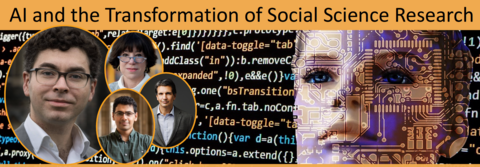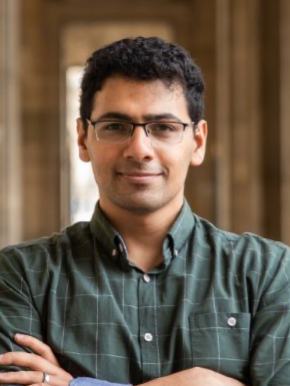

WICI Talk: AI and the Transformation of Social Science Research
Can't make it in person?
Join via Zoom
Meeting ID: 997 2387 9357
Passcode: 585539
WICI Speaker Series with Dr. Igor Grossmann
Thursday, November 23rd, 2023
10:30 a.m. - 12 noon | DC 1302 | University of Waterloo
Psychology professor Igor Grossmann presents a discussion around his article published in Science this summer, co-authored with Professor Dawn Parker (School of Planning) and other leading researchers from the University of Toronto, Yale University and the University of Pennsylvania.
Traditionally, social sciences rely on a range of methods, including questionnaires, behavioral tests, observational studies, and experiments. A common goal in social science research is to obtain a generalized representation of characteristics of individuals, groups, cultures, and their dynamics. With the advent of advanced AI systems, the landscape of data collection in social sciences may shift. Grossmann and colleagues note in the article that large language models (LLMs) trained on vast amounts of text data are increasingly capable of simulating human-like responses and behaviours. This offers novel opportunities for testing theories and hypotheses about human behaviour at great scale and speed.
In this WICI Speaker Series, Igor is joined by Dr. Maura Grossman, Research Professor in the School of Computer Science, Dr. Joel Blit, Associate Professor of Economics, and Dr. Amir-Hossein Karimi, Assistant Professor in Electrical and Computer Engineering, to continue and expand on the discussion.
Registrants are invited to submit questions for the speaker and/or panelists in advance, by submitting a question with your Eventbrite (free) ticket order. Please visit Eventbrite to register in advance and help us reduce waste in ordering light refreshments for attendees.
Please note this event will be held in-person only; a recording will be available on our website following the event.
Speaker and Panelist profiles:

Dr. Igor Grossmann (@psywisdom) is a social-cognitive scientist exploring the interplay of sociocultural factors for wise reasoning and sound judgment. His work utilizes innovative methods at the intersection of big data analytics, psychophysiology, longitudinal surveys, and behavioural experiments.
Grossmann studied at the University of Freiburg and at the University of Michigan, where he received his Ph.D. in 2012. He is currently an Associate Professor of Psychology at the University of Waterloo, Canada. His work has been published in such outlets as Proceedings of the Royal Academy: B, Perspectives on Psychological Science, Psychological Science, PNAS, Journal of Experimental Psychology, Journal of Personality and Social Psychology, andEmotion. His contributions have beenrecognized through numerous awards (e.g., USERN Prize for Social Sciences, SAGE Young Scholar Award from Society for Personality and Social Psychology, Rising Star Award from the Association for Psychological Science, APA Dissertation Award). Grossmann is an Associate Editor of the journal Emotion, and co-hosts the “On Wisdom Podcast,” aiming to disseminate scientific insights from psychology, philosophy and cognitive sciences to the broad academic audience and the general public.

Dr. Maura R. Grossman is a Research Professor in the School of Computer Science at the University of Waterloo, an Adjunct Professor at Osgoode Hall Law School, and an affiliate faculty member of the Vector Institute, all in Ontario, Canada. In Buffalo, New York, she is a well-known and influential eDiscovery attorney and consultant. Previously, with Wachtell, Lipton, Rosen & Katz, she represented Fortune 100 companies and major financial institutions in civil litigation and white collar criminal and regulatory investigations, and advised lawyers and clients on legal, technical, and strategic issues involving eDiscovery and information governance for 17 years. Maura graduated with an A.B., magna cum laude, from Brown University. She earned M.A. and Ph.D. degrees in Psychology from the Derner Institute of Advanced Psychological Studies at Adelphi University, and a J.D., magna cum laude, Order of the Coif, from the Georgetown University Law Center. Her research interests include high-recall information retrieval and responsible AI and Data Science.

Dr. Joel Blit holds a Ph.D. in international economics from the University of Toronto, an M.A. in economics from the University of Western Ontario, an M.B.A. from INSEAD, an M.Sc. in computer engineering from the University of Waterloo and a B.Sc. in engineering science from the University of Toronto. Prior to joining UW, Joël was an assistant professor of economics and international affairs at the Elliott School of International Affairs at George Washington University. Joël regularly advises policymakers and industry leaders on artificial intelligence and the future of work. His framework for thinking about the coming AI revolution has been influential among government and business leaders and was adopted by a multi-billion dollar financial firm as the foundation of its AI strategy.

Dr. Amir-Hossein Karimi is an Assistant Professor in the Department of Electrical and Computer Engineering at the University of Waterloo, and a Vector Institute Faculty Affiliate. Prior to joining Waterloo, he gained extensive industry experience at Meta, Google Brain, and DeepMind, and provided AI-consulting services to numerous startups and incubators. His research focuses on advancing the state of the art in artificial intelligence and charting the path for trustworthy human-AI symbiosis, and explores the intersection of causal inference, explainable AI, and program synthesis. His work has been showcased at esteemed AI and ML-related platforms and his contributions to the field of algorithmic recourse have been acknowledged by these platforms through spotlight and oral presentations, as well as through a book chapter and a highly regarded survey paper in the ACM Computing Surveys.
Location Information
200 University Avenue West
Room DC 1302
Waterloo, ON, CA N2L 3G1